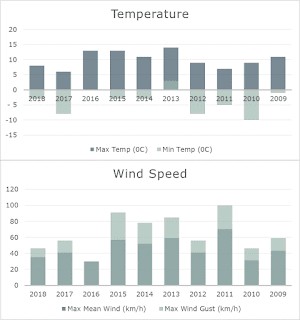December Weather Patterns

Do you remember the weather last December? Some of it wasn't pretty, such as Storm Deirdre. In case you have forgotten, the Met Office's report states the following impact: Freezing rain caused treacherous conditions and multiple traffic accidents, particularly on the M74 and across southern Scotland, and the A66 across the North Pennines was closed. There were further traffic incidents across parts of England and Wales, reports of fallen trees and several hundred homes without power across parts of Wales and Scotland. Planes had to abort landings at Manchester Airport due to strong crosswinds. And here are some contemporary reports: https://www.theguardian.com/uk-news/2018/dec/15/storm-deirdre-batters-britain-snow-freezing-rain https://www.bbc.co.uk/news/uk-scotland-46574942 https://www.theguardian.com/uk-news/2018/dec/16/storm-deirdre-set-to-ease-after-snow-and-gales-wreak-havoc In short, not a great few days to be out and about. Was this a one off or more typical...



